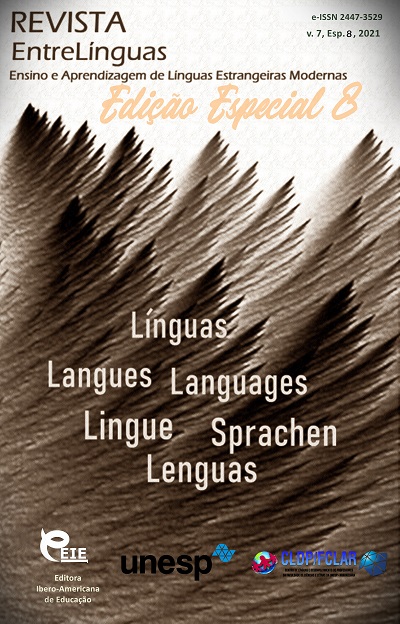Developing moral values among english language learners
DOI:
https://doi.org/10.29051/el.v7iesp.8.16363Keywords:
English learners, Moral education, Education, Moral values, Moral developmentAbstract
The paper presents the results of a theoretical and methodological study of the difficulties and opportunities of developing students' moral values among English language learners in the system of modern education. The moral education of students in the context of the ongoing digitalization of society, caused by world transformation and globalization, requires a specific analysis and development of new approaches to the formation of moral norms and personal values. The authors determine methodological approaches to moral values among English language learners, considering the historical experience and achievements of the past's classical domestic psychological and pedagogical science. The analysis results allowed the authors to conclude that the solution to the problem of the development of the moral values of students in the context of global digitalization is possible by relying on the new theory of moral education, the system of provisions, and methodological principles.
Downloads
References
AMONASHVILI, SH.A. (2017). Fundamentals of humane pedagogy. Moscow: Light.
ANDROSOVA, N.A. (2019). On the moral education of junior schoolchildren. Bulletin of Scientific Conferences, 6(46), 8-10.
APETYAN, M.K. (2014). Psychological and age characteristics of a younger student. Young Scientist, 14(73), 243-244 pp.
BELOGUROVA, V.A. (2014). Education of a morally and physically healthy person. St. Petersburg: Nestor-History.
BELORYBKINA, E.A. (2016). Spiritual and moral development and education of the student's personality in the interaction of formal and non-formal education: a collection of materials from the experience of teachers of researchers of the Nemsky municipal district of the Kirov region in the mode of the Federal experimental site. Moscow: Rainbow-Press.
BELYAEVA, E.V. (2012). Pedagogical tasks of the moral education of primary schoolchildren. The Value System of Modern Society, 22, 302-306.
BOYAZITOVA, T.D. (2019). Topical issues of psychological counseling for children, adolescents and their parents. Collection of scientific papers based on the materials of the international scientific-practical conference dedicated to the 110th anniversary of the birth of F. Dolto. St.Petersburg: CHOUVO "East European Institute of Psychoanalysis".
BOZHOVICH, L.I. & KONNIKOVA, T.E. (2000). Moral formation of the student's personality in the team. Moscow: Enlightenment.
EFIMOVA, O.I., SALAKHOVA, V.B., OSHCHEPKOV, A.A., KHUDYAKOVE, T.L. & DEBERDEEVA, N.A. (2018). Antisuicidal Potential of the Person: Theory and Empirics Research. Modern Journal of Language Teaching Methods, 8(5), 510-517.
ELKONIN, D.B. (2008). Children's psychology: textbook. for university students. Moscow: Academy.
GAMEZO, M.V., PETROVA, E.A. & ORLOVA, L.M. (2003). Developmental and educational psychology: Textbook. manual for students of all specialties of pedagogical universities. Moscow: Pedagogical Society of Russia.
ILYUSHINA, N.N. (2018). Scientific and pedagogical prerequisites for humane pedagogy Sh.A. Amonashvili. Ideas and practices of a humane and personal approach in modern educational conditions. Moscow: Publishing house "Econ-inform".
KAZAKOV, N.A. & KONDRATYEVA, A.A. (2019). Moral education as a factor in achieving personal results in younger students in modern society. Social Relations, 4(31), 28-37.
KOVALEV, N.E., RAISKY, B.F. & SOROKIN, N.A. (1987). Introduction to Pedagogy. Moscow: Enlightenment.
MASLO, I.I. (2017). The role of the teacher in the moral education of primary schoolchildren. URL: http://aneks.spb.ru/dukhovno-nravstvennoe-vospitanie/rol-uchitelia-v-nravstvennom-vospitanii-mladshikh-shkolnikov.html (Date access: 20.01.2021).
PILYUGINA, N.A. (2011). Methodical recommendations on spiritual and moral education of children of senior preschool age: manual. Moscow: MKU "UO Petukhovsky district".
PLATONOVA, L.A. (2014). Formation of spiritual and moral values among younger schoolchildren through lessons on the subject "Foundations of Orthodox Culture". Problems of fundamental training at school and university in the context of the present: Interuniversity collection of scientific works (pp. 51-56). Cherepovets: Cherepovets State University.
PODLASY, I.P. (2008). Primary school pedagogy. Moscow: Vlados.
SALAKHOVA, V.B., DUGAROVA, T.T., EROFEEVA, M.A., DAMDINOV, A.V., KARPOVA, T.G. & PAKHOMOV, R.V. (2020). Education and morale building activity of youth as system-forming factors in providing the national security of Russia: a model of empirical research. URL: http://natal.uern.br/periodicos/ind-ex.php/RTEP/article/view/2237
SALAKHOVA, V.B., SOKOLOVSKAYA, I.E., ULYANOVA, I.V., KARINA, O.V. & TEREKHOVA, A.I. (2019). Deviant behavior formation factors among students: aggressive behavior and internet risks. Práxis Educacional, 15(14), 683-694.
SHPAGINA, A.S. (2020). Moral education of junior schoolchildren in the context of educational activities. Questions of Pedagogy, 1(1), 263-266.
SUKHOMLINSKY, V.A. (2013). How to bring up a real person. On upbringing: The Golden Fund of Pedagogy. Moscow: School Press.
VELICHKO, O.YU. (2010). Methods for stimulating the moral development of primary schoolchildren. Primary school + practice: (tab to even numbers), 7, 97-100.
ZHARKOVA, S.I. (2017). Patriotic education of older preschool children in visual arts. URL: https://docplayer.ru/75939460-Patrioticheskoe-vospitanie-detey-starshego-doshkolnogo-vozrasta-v-izobrazitelnoy-deyatelnosti-vypusknaya-kvalifikacionnaya-rabota.html (Date access: 20.01.2021).
Downloads
Published
How to Cite
Issue
Section
License

This work is licensed under a Creative Commons Attribution-NonCommercial-ShareAlike 4.0 International License.
Os manuscritos aceitos e publicados são de propriedade da Revista EntreLínguas. Os artigos publicados e as referências citadas na Revista EntreLínguas são de inteira responsabilidade de seus autores.
Transferência de direitos autorais – autorização para publicação
Caso o artigo submetido seja aprovado para publicação, já fica acordado que o(s) autor(es) autoriza(m) a UNESP a reproduzi-lo e publicá-lo na EntreLínguas, entendendo-se os termos “reprodução” e “publicação” conforme definição respectivamente dos incisos VI e I do artigo 5° da Lei 9610/98. O artigo poderá ser acessado pela rede mundial de computadores (Internet), sendo permitidas, a título gratuito, a consulta e a reprodução de exemplar do artigo para uso próprio de quem a consulta, desde que haja a citação ao texto consultado. Essa autorização de publicação 328 EntreLínguas, Araraquara, v. 1, n .2, p. 323-328, jul./dez. 2015 não tem limitação de tempo, ficando a UNESP responsável pela manutenção da identificação do(s) autor(es) do artigo. Os artigos publicados e as referências citadas na Revista EntreLínguas são de inteira responsabilidade de seus autores.











